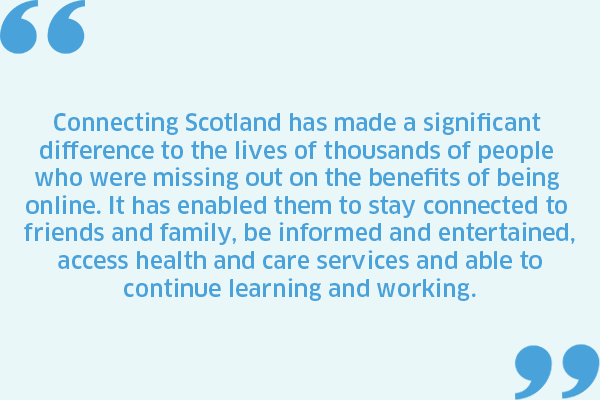
During lockdown, those people who were digitally excluded became even more isolated. Wendy McDougall, Engagement Officer in Healthcare Improvement Scotland – Community Engagement explains how her team helped keep people connected.
When the world went into lockdown, our lives moved online – even accessing health and care services was online, along with grocery shopping and only being able to see loved ones through a video call. As a result, the Scottish Government quickly implemented a £5million initiative called Connecting Scotland to get 9,000 vulnerable households online. The idea being that those who are most vulnerable across our communities will be provided with a device or training that enables them to connect with health and care services, as well as other people in their community and family that may be further afield.
There were eight teams working across the country on the Connecting Scotland initiative and our role was to find community venues that could be used for training on how to use digital equipment and distribute the devices, should they be required. We were an important part of a big jigsaw!

To do this, each engagement office across the 14 NHS board areas spent a number of weeks contacting their local third sector and community group networks. This was a great opportunity for me as a new recruit to pick up the phone and, not only introduce myself as the new Engagement Officer for Forth Valley but, more importantly, actively listen to the challenges that are sadly being faced by people living in poverty and the resulting barriers they can face on a daily basis.
Over 60 community groups were contacted in the Forth Valley area alone and we still managed to make a number of new connections ranging from the Church of Scotland to bowling clubs. The conversations had such a positive impact on me, highlighting that organisations and volunteers were willing to do anything within their power to help others. It was so insightful being in a position to witness a strong sense of community spirit and strength in practice.
Another team was responsible for identifying those who were eligible for devices and data. To be eligible households had to be digitally excluded, on low incomes and be at risk of isolation due to the coronavirus pandemic. We were able to link our community groups to these other teams to ensure they could access the resources of the Connecting Scotland initiative.
Once eligible people or organisations who worked directly with eligible people were identified, they were given an internet-enabled device and were linked with a Digital Champion who provides six months of training and support over the phone.
Connecting Scotland has made a significant difference to the lives of thousands of people who were missing out on the benefits of being online. It has enabled them to stay connected to friends and family, be informed and entertained, access health and care services and able to continue learning and working.
In the Falkirk area, a community centre was able to get iPads, Chromebooks and MiFis, – a MiFi taps into mobile phone networks and uses this to create a mini wireless broadband cloud or hotspot. Four of the community centre leaders have been trained as Digital Champions via the Connecting Scotland initiative. The centre was also able to source funding for six further laptops and a printer to start a computer companions Sunday coffee club. This allowed people to be paired up and learn from each other. They also have an IT suite through the week for people to access and get help.

One of the community centre leaders commented that, “Many of our families are living in deprivation with no access to the internet and cannot afford digital equipment. One of our aims is to help bridge the attainment gap by providing the digital equipment needed to access education to local families. Another barrier our individuals are coming up against is lack of training and isolation. They are isolated in their homes or community and unable to use the internet to stay connected. With the equipment and mentoring we aim to create ‘inclusive growth’ online through Connecting Scotland. By tackling these barriers we are encouraging education, upskilling and contributing to the community which aligns with the national framework.”
It was heartening to hear how communities have accessed Connecting Scotland, and have further developed what is on offer in their areas. I heard someone say that digital connectivity is a necessity for modern life, not a luxury. I’m glad that I could be part of a team working towards this vision.
Little did I know that this was only the first phase of the Connecting Scotland initiative.
As local lockdowns are being put in place across the country, Connecting Scotland clearly has an important role to play. An additional £15 million has recently been allocated by Scottish Government. This will help thousands more families who cannot afford to get online, making sure they are not further disadvantaged by providing the necessary hardware, data, and skills they need to get connected.
Wendy McDougall is an Engagement Officer with Healthcare Improvement Scotland – Community Engagement.
More information about the Connecting Scotland initiative.

Lovely to hear your experience Wendy of working on Connecting Scotland. Well done!
LikeLike